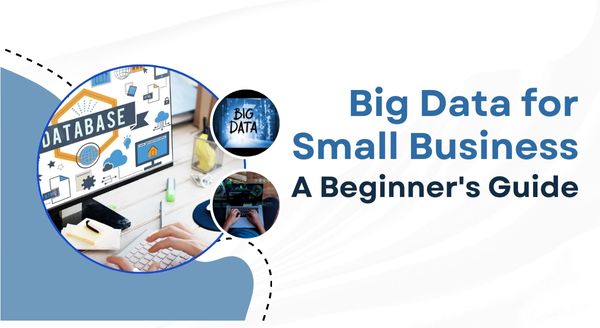Data is valuable. It’s no less than a powerful weapon that can maximise business potential. Large corporations have already started harnessing the power of big data. And now, small businesses are in. They are increasingly recognising its potential to elevate operational outcomes and make decisions that prove groundbreaking for real. Here, you will see how big data management helps in getting insights into crucial things & developing AI to amplify market presence and drive long-term success. According to a source, approximately 97.2% of organizations are investing in big data and AI for digital transformation.
The Evolution of Big Data in Management
The big data has been in the notice since the early 1990s. Its popularity is named after an American computer scientist, John R. Mashev. But the roots of big data are way older. In the 19th century, Frederick Winslow Taylor carried out time management studies, and Henry Ford calculated assembly line speeds to discover how to enhance productivity. These are just a few cues that suggest how sophisticated data analytics incepted.
Computers and the internet evolved in the late 20th century, which triggered an overwhelming surge in data generation. This practice attracted businesses to collect vast amounts of information. And then, the need for advanced analytics tools emerged and finally evolved them to understand the voice of data. By the 1990s, the term “big data” was coined, meaning large and complex data. But traditional data processing applications were not that efficient to handle them.
The Role of Big Data in Small Businesses
Considering the history, large enterprises with substantial resources dominantly harnessed big data management and analytics. Over time, this dominance was over because of some incredible technological advancements. The use of data was democratised because of convenient access to data analytics tools. And now, even small businesses are able to leverage big data for various business purposes. Majorly, it has a groundbreaking role in these practices:
- Cost Reduction: Big data management leads to quick analysis of operational data, which spotlights inefficiencies. This identification guides them in their quick fixing to streamline processes while managing expenses effectively.
- Enhanced Decision-Making: Big data management opened ways to drive insights, which facilitate informed decisions. Now, the data speaks louder about the likelihood of success.
- Improved Customer Understanding: Customers’ data hides their intent, preferences, and purchase abilities. By assessing it, business entities can tailor products and services to fit in their tastes. This practice eventually boosts satisfaction and engagement with brands.
- Competitive Advantage: Large and complex datasets reveal potential trends and opportunities to surpass competitors. For example, businesses can discover the catalogue of competitors to discover in-demand offerings, and accordingly, they develop their own much better products. It helps in winning the cutting edge in the end.
Managing Big Data Effectively in Small Businesses
Now that it’s crystal clear that big data is no less than a helping guide, small enterprises may not be aware of unique challenges that may emerge in managing it. So here are the hurdles along with solutions to navigate them:
1. Resource Constraints
Challenge: Cost is a big issue because small businesses may not have adequate funds to manage resources like software, IT infrastructure, and data specialists for data processing, cleansing, and its management.
Solution: To maximise utility on a limited budget, small enterprises should use cloud-based platforms. The substantial benefit is their ability to scale without breaking the bank in upfront cost. Some impressive open-source tools can also be used to harness robust data management functionalities without bothering with licensing fees.
2. Data Quality Issues
Challenge: Bad or noisy data can never show you the right way. Instead, it takes you on a wrong turn, adversely affecting decision-making.
Solution: You can proactively control noises or distractions like dupes, inconsistent formats, missing details, typos, and more by employing data governance policies. Continue with data audits regularly. From time to time, validate processes and conduct staff training to improve their accuracy and efficiency.
3. Talent Acquisition
Challenge: Large enterprises have massive funds to acquire desirable talent of high-quality. On the flip side, small companies find it no easy ride. Sometimes, attracting & retaining skilled data professionals becomes an intense battle.
Solution: The problem of talent acquisition can be resolved by investing in advanced training programs for employees. Encourage data professionals to develop analytics skills and how to work with advanced data management tools. If possible, consider outsourcing data management tasks for specialised professional services, which majorly hire upskilled employees, invest in their training consistently, and access advanced tools.
4. Privacy and Security Concerns
Challenge: A massive amount of data attracts cyber spies. They frequently hunt for sensitive customer details like credit card or bank details. Many small companies fail to deploy a robust firewall, antivirus, and defensive networking arrangements because of budgetary issues. Eventually, they have to compromise sensitive records in the hands of cyber scammers.
Solution: There is no other way out but to delegate security to robust cybersecurity measures. Leverage encryption, defined access controls, and regular security audits. Additionally, comply with relevant data protection regulations. For instance, if you run a healthcare clinic, ensure governing your data as per the Health Insurance Portability and Accountability Act, or HIPAA regulations, to prevent penalties, which can cost millions of dollars.
Benefits of Big Data for Small Businesses
A piece of information can change lives. This is the power of data. A few more advantages are associated with it, especially for small businesses, which are given below:
- Increased Revenue: Data-driven strategies can guide you to discover new opportunities in diverse markets, which leads to overwhelming revenues.
- Operational Efficiency: Big data related to your operations can help in analysing workflows, bottlenecks, and other shortcomings. This discovery can be further used to optimise workflows, remove data & workflow congestions, reduce wastage, and improve overall productivity.
- Personalised Marketing: In the context of brand promotion, insights into customer behaviour show the intended target audiences and their preferences. This insight helps in aligning campaigns that can actually increase engagement and conversion rates.
- Risk Management: Data gives you the power to foresee the future trends and potential risks. So, meticulously process operational data to project trends and threats for quick fixing or transformation.
Challenges in Leveraging Big Data
Despite being beneficial, big data can attract potential challenges, which can be the following:
- Cost Implications: For small enterprises, it may be unaffordable to deploy an IT infrastructure for managing big data. Affording high-salaried data professionals and IT engineers may be out of their budget.
- Data Privacy Issues: For collecting and storing customer data, the company must be certified and compliant with privacy laws so that legal repercussions can be avoided.
- Integration Complexities: Incorporating big data solutions with obsolete and incompetent systems can be technically challenging. And for new equipment, additional resources cost a lot.
- Rapid Technological Changes: Adapting to the fast-paced evolution of data management, AI, and analytics tools requires continuous learning and adaptation. Small companies can hardly afford it.
Conclusion
Big data presents a transformative opportunity for small businesses, offering insights that can drive growth, efficiency, and competitiveness. By understanding its evolution, recognising the benefits, and proactively addressing the challenges, small businesses can harness the power of big data to make informed decisions and thrive in an increasingly data-driven world.



